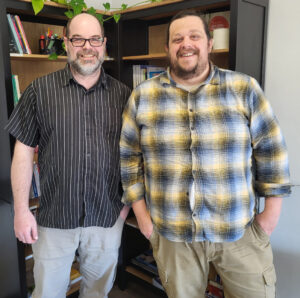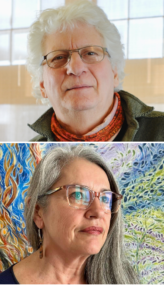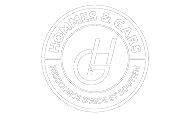Thinking Outside of the Box with Hommes & Gars
 Are you familiar with Hommes & Gars? This community organization has been firmly rooted in the Magdalen Islands since 2013 and is committed to men’s health and well-being on a number of fronts. It’s safe to say: it’s clearly an agent of positive change in the community. How does the organization help men? We talked to Serge Richard, Coordinator, and Pierre-Luc Richard, Awareness and Communications Officer, at Hommes & Gars.
Are you familiar with Hommes & Gars? This community organization has been firmly rooted in the Magdalen Islands since 2013 and is committed to men’s health and well-being on a number of fronts. It’s safe to say: it’s clearly an agent of positive change in the community. How does the organization help men? We talked to Serge Richard, Coordinator, and Pierre-Luc Richard, Awareness and Communications Officer, at Hommes & Gars.
Cultivating Well-Being All the Time
“We’ve realized that we need to think outside the box. I think we stand out from other men’s organizations in Quebec. Sometimes, when I talk about it in groups to which Hommes & Gars belongs, people say to me, “You’re a méchante bibitte,” explained Serge.
That’s because for the organization, supporting men to promote their well-being and helping them take care of their health comes in many diverse ways. “Hommes & Gars isn’t just a place where men come when they’re having difficulties. The helping relationship remains the organization’s priority, but we also try to reach men more broadly. We want to create a living environment with our organization: a place where men can come and see us, whether things are going well or not,” added Serge.
The Services We Offer
How does Hommes & Gars do it? What services does it offer Magdalen men?
Individual Support
First and foremost, the organization offers free, confidential help, and support. It offers one-to-one meetings. Its highly qualified and specially trained counsellors welcome men without judgment, in a spirit of listening and empathy.
“It’s really the first step. Men come for help with issues of domestic violence, both experienced and endured. There’s also everything to do with health and well-being: separation, questioning, grief, anxiety, managing emotions, fatherhood, social relations, etc.” explained Pierre-Luc.
Group Activities
“The 2nd component is group activities, where we tackle different subjects to get people to meet, socialize, and develop other skills at the same time,” continued Pierre-Luc.
“Opening groups starts from a grassroots need. It’s very important for us to listen to people. For example, we have coffee get-togethers, and that really started from a need. Men used to say to us: I want to share lots of things, but I don’t really have anyone in my circle of friends with whom I can have serious discussions. That’s why we decided to open groups,” added Serge.
Reaching out to men through a variety of group activities is also a way of taking preventive action. Cultural activities such as conferences and plays, for example, are a way of addressing male realities and “getting messages across, sparking discussion and reflection,” explained Pierre-Luc. He gave the example of the presentation of a comedy show by Marc Messier, which provided an opportunity to discuss the management of emotions and ego.
Other activities, more focused on overall health, such as community kitchens, promote healthy lifestyle habits. All this, to equip men and nurture their well-being.
Awareness and Education Workshops
And there’s more because Hommes & Gars undertakes many other initiatives. “The 3rd component is more about awareness-raising and popular education. We try to be present as much as possible and create links with other organizations in the area,” replied Pierre-Luc.
“We conduct workshops in schools, particularly on healthy, egalitarian love relationships. In some cases, workshops can be given in organizations. We have a workshop, for example, on sexual harassment in the workplace. These workshops are given in collaboration with other organizations in the community. We also have a workshop on how to encourage men to ask for help when they need it,” he continued.
Serge also told us about a project in partnership with the Secrétariat à la condition féminine, which has just been formalized. “We want to run workshops on sexual harassment in sport among young people. We hear a lot, for example, about what’s going on at Hockey Canada. We want to take the players from an early age to raise awareness, talk about harassment, sexual harassment, consent. We’re going to set up workshops to raise awareness among youngsters, parents, and coaches alike,” he said. It’s another example of the organization’s commitment to promoting positive, healthy behaviours among boys.
And that’s not all. In fact, the organization’s awareness-raising activities also involve communications. “We try to get the word out about our services and talk about health and well-being. We have radio spots, and a Facebook page ,“ replied Pierre-Luc.
Tips for Taking Care of Yourself
With all these services available, it’s clear just how much Hommes & Gars is working to promote men’s well-being. So, we asked Serge and Pierre-Luc if they had a few simple, easily accessible tips to share with us. “On our site, we have self-assessment tools on our love relationships, which help to evaluate, for example: do I have a bad temper? Am I jealous? We do this on our own, and it helps us put things into perspective. Sometimes, when we’re going through more difficult episodes, it’s good to stop and take stock of the situation, then take the time to look at the resources available to us,” explained Pierre-Luc.
Hommes & Gars also offers a variety of tools and tips to help us focus on our health and well-being in its newsletter, another of its awareness-raising initiatives. “There are lots of tips, lots of information. We look for partners to provide us with a wide range of tips. For example, we’ve teamed up with a family doctor who gives us articles to inform people about the importance of taking care of their physical health. We also collaborate with the Gaspé Peninsula – Magdalen Islands Community Justice Center (GPMICJC) on all kinds of subjects that can be sources of stress: fathers’ rights, protection mandates, housing law, etc.,” added the awareness and communications agent.
Interested? Serge and Pierre-Luc invite you to become a member of Hommes & Gars, free of charge, by filling out this form. By becoming a member, you’ll receive this newsletter, as well as invitations to the organization’s activities.
Knocking on the Door of Hommes & Gars
“Our health, our well-being: it’s not just about taking care of them when things aren’t going well. It’s about cultivating them, having the tools in case things don’t go well, knowing what the resources are. We want people to have the tools to take preventive action. We want men to know that the day they run into difficulties and need help, they’ll feel comfortable coming to us,” explained Pierre-Luc, outlining the wide range of actions taken by Hommes & Gars to complement its help and support service.
And the help is there. Even if it’s still difficult for many men to ask for help, more men are daring to do so. “We’re talking about it more and more, but I think we need to keep talking about it more and more. Men are capable of change,” added Serge.
To learn more about Hommes & Gars, visit its website.



 “Every time we help a man, we help his children and his partner. It’s positive for society as a whole,” stated Marie Hudon, Assistant Executive Director of Convergence – Service d’aide aux hommes de la Gaspésie, accompanied by Jean-Jacques Élie, the organization’s counselor and Executive Director. Since its foundation, Convergence has been committed to its mission of helping the male population of the Gaspé Peninsula. Men and teenagers aged 16 and over are welcome at this organization, where they are welcomed, their needs analyzed, and non-judgement is practiced. In 12 years, nearly 2,500 different men have found help from Convergence’s team of counsellors. What services do we offer? And what tips should we know to improve our relationships with our loved ones? We met Jean-Jacques and Marie to find out.
“Every time we help a man, we help his children and his partner. It’s positive for society as a whole,” stated Marie Hudon, Assistant Executive Director of Convergence – Service d’aide aux hommes de la Gaspésie, accompanied by Jean-Jacques Élie, the organization’s counselor and Executive Director. Since its foundation, Convergence has been committed to its mission of helping the male population of the Gaspé Peninsula. Men and teenagers aged 16 and over are welcome at this organization, where they are welcomed, their needs analyzed, and non-judgement is practiced. In 12 years, nearly 2,500 different men have found help from Convergence’s team of counsellors. What services do we offer? And what tips should we know to improve our relationships with our loved ones? We met Jean-Jacques and Marie to find out.






